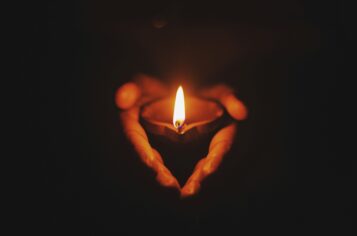
On this Earth Day, Tuesday 22 April, Jo Herbert-James challenges us to reflect on the part we are called to play in protecting our planet.
Have you ever been stopped in your tracks by a beautiful sunset? Stopped to smell a flower? Been captivated by a small bird digging for worms? When we stop – when we are present and take in nature – it truly is a wonder. Mountain scenes or vast oceans can take our breath away and often lead us to contemplate the wonder of God like little else.
Any keen bird watcher knows that Earth Day, April 22nd, coincides with the beginnings of the return of the swift to the UK from their migration to Africa. They are among the most iconic signs of spring; swooping silhouettes in the skies, nesting under eaves, filling the air with life along with many other migratory birds. Swifts are a wonder, masters of the sky, living on the wing, only landing to nest. They eat, drink, sleep, and even mate on the wing, travelling thousands of miles each year down through Europe to Africa and back again.
Yet, like many other species, these migratory birds are more and more at risk. The UK has already lost nearly 20% of studied species since 1970, and worldwide, the average size of wildlife populations has fallen by a staggering 73%.1
We hear these sorts of statistics in our news feeds and documentaries, but why do these numbers matter and what is the impact on this interconnected world? How curious are we about the reasons why they make the headlines?
Migratory birds are not bound by passports, cultures, and language differences. They connect ecosystems across vast distances and play crucial roles in pest control, seed dispersal, and many other things. They remind us that our one earth is shared by us all and we need everyone to play their part to protect.
Climate change is one of the largest contributors to these reductions in species. Increased wildfires, floods, droughts and other extreme weather devastates wildlife and its habitats.
Climate change also has devastating impacts on people. Those who live in climates most sensitive to changing weather feel the impacts of droughts on their ability to grow crops and access reliable water supplies. Floods wash homes, business, and livelihoods away. Both lead to food insecurity, sometimes forced migration, and conflicts over land.
Yet in some contexts, climate change has become an extremely divisive topic; highly politicised and deeply confusing to know what to believe. It can therefore be difficult to hold conversations without those divides quickly showing up. It can be helpful to step back, in these moments and return to the bible.
The earliest command we find in the bible is for people to care for the earth, the garden that God had put them in. What do you imagine God intended when he said these things to Adam? I’m not convinced that the alarming nature loss we see today or the stories from communities most affected by climate change are what God had in mind. So, this Earth Day, let me invite you to draw on the tools that Difference offers us.
How are you being present in God’s world? Can you pause a little longer to smell a flower and wonder at why God might have created such beautiful scents to be enjoyed by both people and pollinators? If you are in the northern hemisphere, can you observe the spring skies and simply utter a little ‘welcome back’ to our migratory birds?
Ask yourself how curious you are the next time you read a headline about the environment, or find yourself in a conversation with opposing views? Rather than defend a view, ask yourself why you disagree. Ask your conversation partner to explain further how they came to their view without defending your own.
And can you reimagine this Earth Day how the climate and nature might be if God’s people returned to that first command and imagined together what God’s intention might have been? What changes might you make in your church community or your everyday lifestyle to further steward and care for creation?
Swift action is needed – check out A Rocha’s Campaign for Creation here: https://arocha.org.uk/get-involved/campaign-for-creation/
- Living Planet Report 2024: https://livingplanet.panda.org/en-GB/ ↩︎

Jo Herbert-James serves with A Rocha UK, working to engage the church and Christians in caring for God’s creation. She also lectures at Moorlands Bible College and is a Deputy Leader for the World Evangelical Alliance Mission Commission, focusing on creation care. Having founded The Justice Conference UK and worked with Tearfund for 16 years, she is passionate about equipping Christians to engage practically and theologically with issues of social justice, sustainability, and care for God’s creation.



